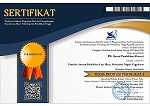Penyiapan calon guru untuk anak berkebutuhan khusus di Indonesia: Kondisi saat ini dan Tantangan
Abstract
Keywords
Full Text:
PDFReferences
Brownell, M. T., Ross, D. D., Colón, E. P., & McCallum, C. L. (2005). Critical features of special education teacher preparation. The Journal of Special Education, 38(4), 242–252. https://doi.org/10.1177/00224669050380040601
Cho, E., Roberts, G. J., Capin, P., Roberts, G., Miciak, J., & Vaughn, S. (2015). Cognitive attributes, attention, and self-efficacy of adequate and inadequate responders in a fourth grade reading intervention. Learning Disabilities Research & Practice, 30(4), 159–170. https://doi.org/10.1111/ldrp.12088
Darling-Hammond, L., Macdonald, M. B., Snyder, J., Whitford, B. L., Ruscoe, G., & Fickel, L. (2000). Studies of excellence in teacher education: Preparation at the graduate level. Washington, DC: AACTE Publications.
Dingle, M., Falvey, M. A., Givner, C. C., & Haager, D. (2004). Essential special and general education teacher competencies for preparing teachers for inclusive settings. Issues in Teacher Education, 13(1), 35–50. Retrieved from http://eric.ed.gov/?id=EJ796426
Gage, N. A., Lierheimer, K. S., & Goran, L. G. (2012). Characteristics of students with high-incidence disabilities broadly defined. Journal of Disability Policy Studies, 23(3), 168–178. https://doi.org/10.1177/1044207311425385
Gilberts, G. H., & Lignugaris-Kraft, B. (1997). Classroom management and instruction competencies for preparing elementary and special education teachers. Teaching and Teacher Education, 13(6), 597–610. https://doi.org/10.1016/S0742-051X(97)80003-0
Hadis, F. A. (2005). Toward Inclusive, inclusive education in Indonesia: A country report. Retrieved from http://www.jldd.jp/gtid/global_trend/6-Toward_InclusiveInclusive_Educa-Indonesia-Co.pdf
Hallahan, D. P., & Kauffman, J. M. (1977). Labels, categories, behaviors: ED, LD, and EMR reconsidered. The Journal of Special Education, 11(2), 139–149. https://doi.org/10.1177/002246697701100202
Haring, N. G. (2016). Republication of “educational services for the severely and profoundly handicapped. The Journal of Special Education, 50(2), 69–74. https://doi.org/10.1177/0022466916651465
Holland, J. M., & Hornby, & G. (1992). Competences for teachers of children with special educational needs. Journal of In-Service Education, 18(1), 59–62. https://doi.org/10.1080/0305763920180109
Kokkinos, C. M., & Antoniadou, N. (2013). Bullying and victimization experiences in elementary school students nominated by their teachers for Specific Learning Disabilities. School Psychology International, 34(6), 674–690. https://doi.org/10.1177/0143034313479712
Kurniawati, F., Minnaert, A., Mangunsong, F., & Ahmed, W. (2012). Empirical study on primary school teachers’ attitudes towards inclusive education in Jakarta, Indonesia. Procedia - Social and Behavioral Sciences, 69, 1430–1436. https://doi.org/10.1016/j.sbspro.2012.12.082
Luciano, S., & Savage, R. S. (2007). Bullying risk in children with learning difficulties in inclusive educational settings. Canadian Journal of School Psychology, 22(1), 14–31. https://doi.org/10.1177/0829573507301039
Mcdermott, P. A., Goldberg, M. M., Watkins, M. W., Stanley, J. L., & Glutting, J. J. (2006). A nationwide epidemiologic modeling study of LD: Risk, protection, and unintended impact. Journal of Learning Disabilities, 39(3), 230–251.
McDonnell, J. J., Hardman, M. L., & McDonnell, A. P. (2003). Introduction to persons with moderate and severe disabilities: Educational and social issues (2nd Ed.). Boston : Allyn and Bacon .
Morgan, P. L., Farkas, G., Tufis, P. A., & Sperling, R. A. (2008). Are reading and behavior problems risk factors for each other? Journal of Learning Disabilities, 41(5), 417–436. https://doi.org/10.1177/0022219408321123
Poernomo, B. (2016). The implementation of inclusive education in Indonesia : Current problems and challenges. American International Journal of Social Science, 5(3), 144–150. Retrieved from http://www.umm.ac.id/en/detail-4-benang-kusut-pendidikan-indonesia-opini-umm.html.
Rahardja, D. (2016). Pendidikan luar biasa dalam perspektif dewasa ini. JASSI ANAKKU, 9(1), 76–88. Retrieved from http://ejournal.upi.edu/index.php/jassi/article/view/3911/2792
Riggs, N. R., Greenberg, M. T., Kusché, C. A., & Pentz, M. A. (2006). The mediational role of neurocognition in the behavioral outcomes of a social-emotional prevention program in elementary school students: Effects of the PATHS curriculum. Prevention Science, 7(1), 91–102. https://doi.org/10.1007/s11121-005-0022-1
Rudiyati, S. (2012). Substansi komponen kompetensi guru sekolah inklusif bagi anak berkelainan/berkebutuhan khusus pendidikan khusus. Jurnal Penelitian Dan Evaluasi Pendidikan, 16(2), 533–552. Retrieved from https://journal.uny.ac.id/index.php/jpep/article/view/1130/2820
Rudiyati, S., Pujaningsih, & Ambarwati, U. (2010). Penanganan anak berkesulitan belajar berbasis akomodasi pembelajaran. Jurnal Kependidikan, 40(2), 187–200. Retrieved from https://journal.uny.ac.id/index.php/jk/article/view/498/355
Rudiyati, S., Pujaningsih, P., & Mumpuniarti, M. (2017). Teacher knowledge and experience dealing with students with learning disabilities in inclusive elementary school and implications to learning accommodation and modification. Proceedings of the 1st Yogyakarta International Conference on Educational Management/Administration and Pedagogy (YICEMAP 2017). https://doi.org/10.2991/yicemap-17.2017.47
Sabornie, E. J., Evans, C., & Cullinan, D. (2006). Comparing characteristics of high-incidence disability groups. Remedial and Special Education, 27(2), 95–104. https://doi.org/10.1177/07419325060270020701
Schnoes, C., Reid, R., Wagner, M., & Marder, C. (2006). ADHD among students receiving special education services: A national survey. Exeptional Children, 72(4), 483–496.
Sindelar, P. T., Brownell, M. T., & Billingsley, B. (2010). Special Education Teacher Education Research: Current Status and Future Directions. Teacher Education and Special Education: The Journal of the Teacher Education Division of the Council for Exceptional Children, 33(1), 8–24. https://doi.org/10.1177/0888406409358593
Sulaiman, ahmad. (2018). Promoting collaborative consultation to improve the quality of inclusive education in Indonesia. Academic Journal Perspective: Language, Education, and Literature, 6(2), 80–88. Retrieved from http://jurnal.unswagati.ac.id/index.php/Perspective/article/view/1357
Sunardi, Yusuf, M., Gunarhadi, Priyono, Yeager, J. L., & Yeager, J. L. (2011). The implementation of inclusive education for students with special needs in Indonesia. Excellence in Higher Education, 2(1), 1–10. https://doi.org/10.5195/EHE.2011.27
Tarnoto, N. (2016). Permasalahan-permasalahan yang dihadapi sekolah penyelenggara pendidikan inklusi pada tingkat SD. Humanitas, 13(1), 50–61. Retrieved from http://digilib.mercubuana.ac.id/manager/t!@file_artikel_abstrak/Isi_Artikel_626984286959.pdf
Xin Wei, Yu, J., & Shaver, D. (2014). Longitudinal effects of ADHD in children with learning disabilities or emotional disturbances. Exceptional Children, 80(2), 205–219. Retrieved from https://login.proxy.lib.uni.edu/login?url=http://search.ebscohost.com/login.aspx?direct=true&db=eft&AN=93301928&site=ehost-live
Yusuf, M. (2012). Kinerja kepala sekolah dan guru dalam mengimplementasikan pendidikan inklusif. Jurnal Pendidikan
DOI: https://doi.org/10.21831/jpk.v15i1.24894
Refbacks
- There are currently no refbacks.
Copyright (c) 2022 JPK (Jurnal Pendidikan Khusus)

This work is licensed under a Creative Commons Attribution-ShareAlike 4.0 International License.
Supervised by:
Our Journal has been indexed by:

JPK (Jurnal Pendidikan Khusus) is licensed under a Creative Commons Attribution-ShareAlike 4.0 International License.
Based on a work at https://journal.uny.ac.id/index.php/jpk.








